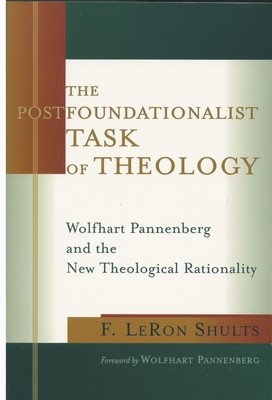
- We will send in 10–14 business days.
- Author: F Leron Shults
- Publisher: William B. Eerdmans Publishing Company
- ISBN-10: 0802846866
- ISBN-13: 9780802846860
- Format: 15.3 x 22.9 x 1.5 cm, minkšti viršeliai
- Language: English
- SAVE -10% with code: EXTRA
Reviews
Description
In recent years the theological writings of Wolfhart Pannenberg have exerted considerable influence. However, Pannenberg's work has also been criticized for not taking seriously the postmodern challenge to traditional conceptions of rationality and truth. This volume by F. LeRon Shults argues that the popular "foundationalist" reading of Pannenberg is a misinterpretation of his methodology and shows that, in fact, the structural dynamics of Pannenberg's approach offer significant resources for the postfoundationalist task of theology in our postmodern culture. Shults begins by laying out the first comprehensive summary and interpretation of the emerging postfoundationalist model of theological rationality. He then revisits Pannenberg's theological method and finds the German theologian to be a surprising ally in the quest to reconstruct a theological rationality along postfoundationalist lines. In the course of his discussion, Shults challenges views that see the future, reason, or history as the central concept of Pannenberg's thought and offers instead a new interpretation of Pannenberg's basic theological principle as understanding and explaining all things sub ratione Dei (under the aspect of the relation to God)-an interpretation endorsed by Pannenberg himself in the book's foreword. Shults also focuses on Pannenberg's unique way of linking philosophical and systematic theology and demonstrates how the underlying reciprocity of this method can carry over into the postfoundational concern to link hermeneutics and epistemology in the postmodern context.
EXTRA 10 % discount with code: EXTRA
The promotion ends in 21d.16:59:54
The discount code is valid when purchasing from 10 €. Discounts do not stack.
- Author: F Leron Shults
- Publisher: William B. Eerdmans Publishing Company
- ISBN-10: 0802846866
- ISBN-13: 9780802846860
- Format: 15.3 x 22.9 x 1.5 cm, minkšti viršeliai
- Language: English English
In recent years the theological writings of Wolfhart Pannenberg have exerted considerable influence. However, Pannenberg's work has also been criticized for not taking seriously the postmodern challenge to traditional conceptions of rationality and truth. This volume by F. LeRon Shults argues that the popular "foundationalist" reading of Pannenberg is a misinterpretation of his methodology and shows that, in fact, the structural dynamics of Pannenberg's approach offer significant resources for the postfoundationalist task of theology in our postmodern culture. Shults begins by laying out the first comprehensive summary and interpretation of the emerging postfoundationalist model of theological rationality. He then revisits Pannenberg's theological method and finds the German theologian to be a surprising ally in the quest to reconstruct a theological rationality along postfoundationalist lines. In the course of his discussion, Shults challenges views that see the future, reason, or history as the central concept of Pannenberg's thought and offers instead a new interpretation of Pannenberg's basic theological principle as understanding and explaining all things sub ratione Dei (under the aspect of the relation to God)-an interpretation endorsed by Pannenberg himself in the book's foreword. Shults also focuses on Pannenberg's unique way of linking philosophical and systematic theology and demonstrates how the underlying reciprocity of this method can carry over into the postfoundational concern to link hermeneutics and epistemology in the postmodern context.


Reviews